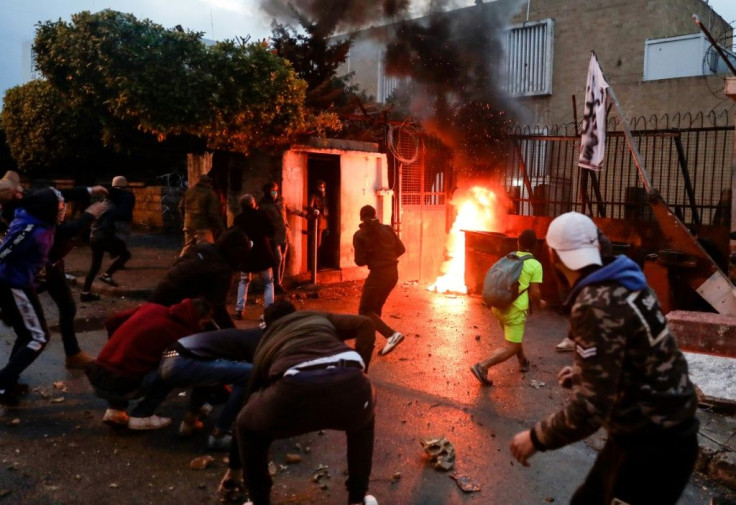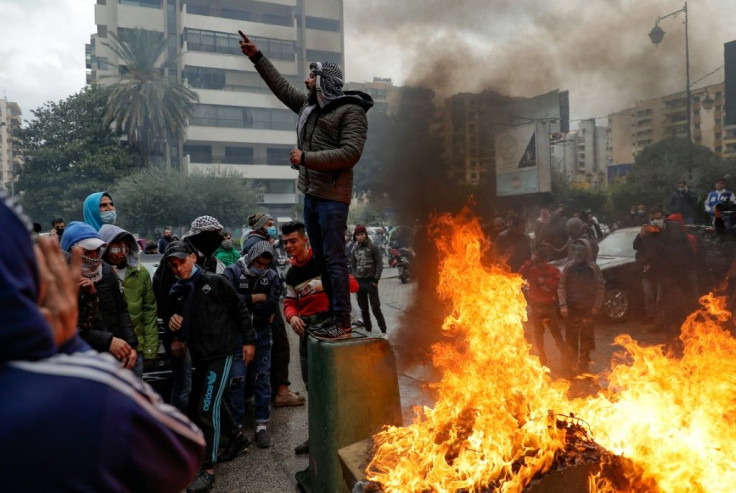Lebanon Lockdown Protestors Target Tripoli's Political Barons
Angry crowds gathered outside the Tripoli homes of some of Lebanon's top politicians on Thursday, torching rubbish and smashing surveillance cameras as rage grows over the government's handling of the coronavirus pandemic.
"We want to burn down all their houses the way they burned our hearts," said Omar Qarhani, an unemployed father of six.
"Let any politician dare to walk on the streets of Tripoli."
The impoverished northern city has seen four days of clashes between security forces and residents outraged by curfew measures they say are destroying their livelihoods.
The pandemic has added to the misery of Lebanon's worst financial downturn since the 1975-1990 civil war and stoked simmering anger against a political class seen as corrupt and incompetent.

On Monday that rage spilled onto the streets of Tripoli, Lebanon's poorest city, where more than half the population lives below the poverty line and many rely on informal jobs, making them particularly vulnerable to lockdown measures.
By Thursday the violence claimed its first victim: Omar Tayba, who succumbed to a bullet wound sustained during the previous night's clashes.
The protesters showed no sign of backing down, instead staging angry rallies outside the homes of local politicians -- rich men Qarhani said have done almost nothing to help.
"They have shamed this city," the 42-year-old said as demonstrators clamoured nearby.
Tripoli was at the forefront of a nationwide protest movement that erupted in October 2019 to demand deep-rooted reforms of Lebanon's nepotistic, sectarian political system.

Demonstrations across the country had petered out as the coronavirus pandemic spread.
A massive August 4 explosion at Beirut's port saw even the most die-hard of activists retreat from the streets.
But rallies broke out again this week in Tripoli after authorities extended until February 8 a total lockdown meant to stem one of the world's steepest surges in Covid-19 infections.

Thursday's clashes between protesters and security forces injured at least 102 people and hospitalised five, according to the Lebanese Red Cross.
Demonstrators lobbed molotov cocktails at the municipality headquarters in the city, causing a large blaze to break out inside, according to the official National News Agency.
They also fired molotov cocktails and fire works at security forces stationed outside a government building, according to the Internal Security Forces.
Earlier in the day, a procession of army jeeps had followed as demonstrators, many in full face masks, walked through neighbourhoods, dragging metal barricades and tipping over dumpsters to block the street.
Outside the house of top Tripoli politician Faysal Karameh, protestor Adnan Abdullah vented his anger against the city's ruling elite.
"We target the homes of politicians because they are the reason for the situation," said the 42-year-old.
"Our leaders have been the same for 30 years. They ruined the futures of our youth and led our country to ruin."
Outside the house of Samir al-Jisr, another key political figure, demonstrators started a fire that was quickly put out by security forces.
Protesters responded by chanting: "Why are you protecting them?"
Tensions have steadily escalated in Tripoli since Monday and security forces have deployed reinforcements across the city.
Protesters on Wednesday night lobbed stones, fireworks and molotov cocktails at security forces who responded with tear gas and rubber bullets, in clashes which left 200 people wounded.
Adnan al-Hakim, a 19-year-old demonstrator, was limping outside Jisr's house on Thursday, a bloody bandage wrapped around his face.
He said he had been hit in the leg by a rubber bullet and bludgeoned in the face -- but he remained defiant.
"We are obliged to take the streets to secure our rights," he said.
He cursed the city's politicians.
"They are forcing us to live in humiliation. We can't take it anymore," he said.





















